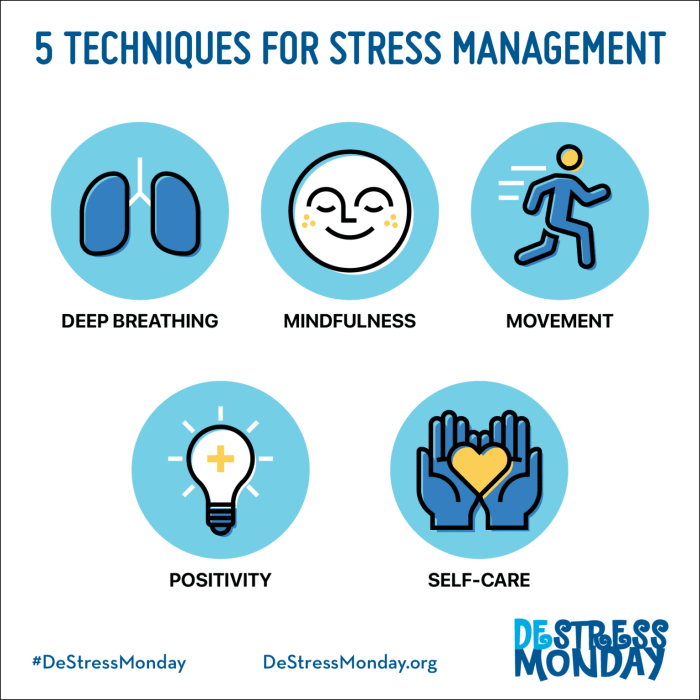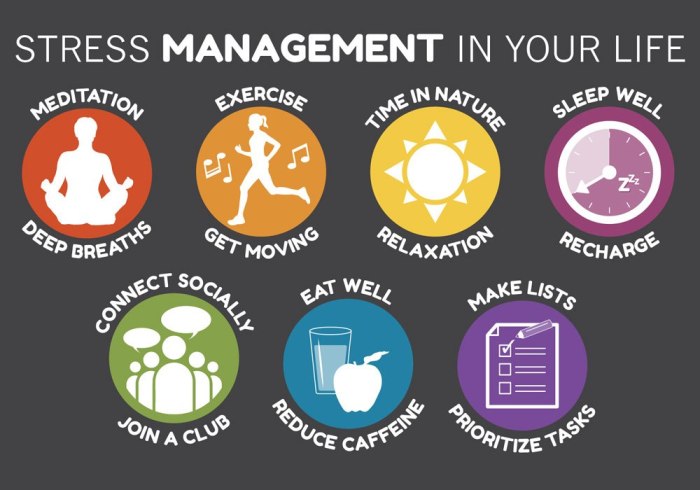Stress Management Tips: Keep Calm, Stay Cool, and Relax – This is where we dive into the ultimate guide to handling stress like a boss, hip and happening style.
Ready to unlock the secrets to a stress-free life? Let’s get started on this journey to zen!
Introduction to Stress Management Tips
Stress is a natural reaction to the demands of daily life that can have a significant impact on both mental and physical health. It can manifest in various ways, such as feeling overwhelmed, anxious, or irritable. Managing stress effectively is crucial to maintaining overall well-being and preventing the development of more serious health issues.
Common Stressors in Daily Life
- Work-related stress: Deadlines, workload, and conflicts with colleagues can be major sources of stress in the workplace.
- Relationship stress: Issues with family, friends, or romantic partners can lead to emotional strain and tension.
- Financial stress: Concerns about money, debt, or job security can cause significant stress and anxiety.
- Health-related stress: Dealing with illness, chronic pain, or caring for a sick loved one can be incredibly stressful.
Healthy Lifestyle Habits for Stress Management
Living a healthy lifestyle is crucial for managing stress effectively. By incorporating simple habits into your daily routine, you can improve your overall well-being and reduce stress levels significantly.
Regular Exercise
Regular exercise is not only beneficial for physical health but also plays a vital role in managing stress. Physical activity releases endorphins, also known as the “feel-good” hormones, which can help elevate your mood and reduce stress. Aim for at least 30 minutes of exercise most days of the week to experience these benefits.
Balanced Diet
Eating a balanced diet rich in fruits, vegetables, whole grains, and lean proteins can provide your body with essential nutrients to combat stress. Avoiding excessive caffeine, sugar, and processed foods can help stabilize energy levels and improve overall well-being.
Sufficient Sleep
Getting an adequate amount of sleep is crucial for both physical and mental health. Lack of sleep can increase stress levels, affect mood, and impair cognitive function. Aim for 7-9 hours of quality sleep each night to feel refreshed and ready to tackle the day ahead.
Mindfulness Practices
Mindfulness practices such as meditation and yoga can help calm the mind, reduce anxiety, and improve overall mental clarity. Taking a few minutes each day to practice mindfulness can help you stay present and focused, reducing the impact of stress on your well-being.
Setting Boundaries
Setting boundaries with work, relationships, and personal commitments is essential for managing stress effectively. Learning to say no when necessary and prioritizing self-care activities can help prevent burnout and promote a healthier work-life balance.
Prioritizing Self-Care Activities
Self-care activities such as reading, taking a bath, going for a walk, or practicing a hobby can help you relax and recharge. Making time for activities that bring you joy and relaxation is essential for managing stress and maintaining overall well-being.
Time Management Strategies

Effective time management is crucial for reducing stress levels and improving productivity. By implementing certain strategies, individuals can better prioritize tasks, stay organized, and create a more balanced work-life schedule.
Creating To-Do Lists
- Write down all tasks that need to be completed in a day or week.
- Break down larger tasks into smaller, more manageable ones.
- Check off tasks as you complete them for a sense of accomplishment.
Prioritizing Tasks
- Identify urgent and important tasks that need immediate attention.
- Rank tasks based on deadlines, importance, and impact on overall goals.
- Focus on high-priority tasks first to prevent feeling overwhelmed.
Avoiding Multitasking
- Focus on one task at a time to improve concentration and efficiency.
- Avoid switching between tasks frequently, as it can lead to increased stress and decreased productivity.
- Complete one task before moving on to the next to maintain quality work.
Time Blocking and Scheduling Breaks
- Allocate specific time blocks for different tasks or activities throughout the day.
- Include short breaks in between tasks to rest and recharge.
- Use breaks to engage in activities that promote relaxation, such as stretching or deep breathing exercises.
Relaxation Techniques for Stress Relief: Stress Management Tips

In today’s fast-paced world, stress has become a common part of our lives. However, it is essential to find ways to relax and unwind to maintain our mental and physical well-being. Here are some relaxation techniques that can help you relieve stress and feel more at ease:
Deep Breathing Exercises
Deep breathing exercises are a simple yet effective way to calm your mind and reduce stress. By taking slow, deep breaths, you can lower your heart rate and blood pressure, helping you feel more relaxed and centered.
Progressive Muscle Relaxation
Progressive muscle relaxation involves tensing and then relaxing each muscle group in your body. This technique can help release physical tension and promote a sense of relaxation and calm.
Listening to Music
Listening to soothing music can have a powerful impact on your mood and stress levels. Music has the ability to elicit emotional responses and can help you unwind and de-stress after a long day.
Spending Time in Nature
Spending time in nature has been shown to have numerous benefits for mental health. Whether it’s taking a walk in the park or sitting by the beach, connecting with nature can help reduce stress and improve overall well-being.
Engaging in Hobbies
Engaging in hobbies that you enjoy can be a great way to relax and unwind. Whether it’s painting, gardening, or playing a musical instrument, hobbies can provide a creative outlet and a sense of accomplishment, leading to reduced stress levels.
Taking Regular Breaks, Stress Management Tips
It’s important to take regular breaks throughout the day to give your mind and body a chance to rest and recharge. Whether it’s a short walk, a quick meditation session, or simply closing your eyes for a few minutes, incorporating breaks into your daily routine can help prevent burnout and reduce stress.
